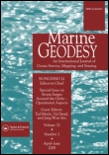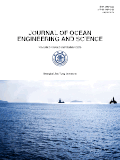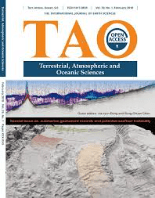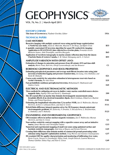
Physical Oceanography
Scope & Guideline
Connecting Science and the Sea
Introduction
Aims and Scopes
- Ocean Dynamics and Circulation:
Research on wind-driven ocean circulation models and their boundary conditions, exploring physical processes and implications for coastal and marine environments. - Geophysical Techniques and Applications:
Utilization of advanced geophysical methods such as seismic inversion, GNSS data analysis, and gravity modeling to investigate subsurface structures and processes. - Environmental Monitoring and Assessment:
Studies that employ geophysical and remote sensing techniques to monitor environmental changes, such as landslides, droughts, and hydrothermal alterations. - Geological and Tectonic Investigations:
Examination of geological structures and tectonic events through geophysical data, contributing to the understanding of seismic risks and earth dynamics. - Innovative Methodologies in Geophysics:
Development of new analytical approaches, including machine learning and optimization techniques, to enhance the accuracy and efficiency of geophysical data interpretation.
Trending and Emerging
- Machine Learning and AI in Geophysics:
An increase in the application of machine learning techniques for data analysis and interpretation indicates a growing trend towards using artificial intelligence to enhance geophysical research. - Climate Change and Environmental Impact Studies:
Recent papers emphasize the impact of climate change on ocean dynamics and environmental conditions, reflecting a rising interest in sustainability and ecological assessments. - Integrated Geophysical Studies:
There is a notable trend towards integrating multiple geophysical techniques to provide a more comprehensive understanding of geological and oceanographic phenomena. - Real-time Monitoring Technologies:
Emerging themes include the use of GNSS and other real-time monitoring technologies to assess and respond to geophysical hazards, indicating a shift towards proactive rather than reactive research. - Geophysical Data Fusion:
Research increasingly focuses on the fusion of various geophysical data types to improve modeling accuracy and understanding of complex geological systems.
Declining or Waning
- Historical Seismic Events:
There has been a noticeable decrease in papers focused on historical seismic events and their analysis, suggesting a shift towards contemporary seismicity and real-time monitoring. - Traditional Geological Methods:
The reliance on classical geological analysis methods appears to be waning, with fewer studies published that do not integrate advanced geophysical or computational techniques. - Localized Case Studies:
Research focusing solely on localized geological case studies without broader implications or methodologies has become less prominent, as the journal shifts towards more comprehensive and integrative studies.
Similar Journals

MARINE GEODESY
Connecting Scholars to the Heart of Marine ResearchMARINE GEODESY, an esteemed journal published by Taylor & Francis Inc, delves into the intricate field of oceanography, aiming to contribute profoundly to the understanding of marine spatial dynamics and geophysical processes. With an ISSN of 0149-0419 and an E-ISSN of 1521-060X, this journal has a commendable standing, currently classified in the 2023 Q2 quartile, reflecting its influential presence in the realm of Earth and Planetary Sciences, particularly oceanography, where it ranks 49th out of 145 journals. Since its inception in 1977 and its ongoing publication until 2024, MARINE GEODESY has been dedicated to disseminating groundbreaking research, case studies, and reviews that are crucial for scholars, professionals, and students engaged in the exploration of marine environments. While currently not an open-access journal, it nevertheless offers vital insights into marine geospatial analytics and geodesy, augmenting the knowledge base necessary for tackling contemporary challenges in marine science and geography.

Ocean and Coastal Research
Bridging science and sustainability in oceanography.Ocean and Coastal Research, published by the Institute Oceanográfico of the University of São Paulo, is an essential academic journal dedicated to advancing the fields of Aquatic Science, Oceanography, and Water Science and Technology. Established in 2020, the journal has quickly become a noteworthy platform contributing to the understanding and sustainable management of marine and coastal ecosystems, with an open access model that promotes the dissemination of critical research findings. Although currently categorized in the fourth quartile across its respective fields in 2023, the journal serves as an emerging repository of valuable insights for researchers, professionals, and students alike, aiming to make impactful discoveries that address contemporary challenges in ocean conservation and resource management. The journal's editorial team is committed to fostering interdisciplinary collaboration and upholding rigorous peer-review standards, thereby ensuring high-quality contributions that reflect the dynamic nature of marine science. With an E-ISSN of 2675-2824, all access to published articles is freely available, supporting global research efforts addressing crucial environmental issues.

Indian Journal of Geo-Marine Sciences
Exploring the Depths of Marine KnowledgeThe Indian Journal of Geo-Marine Sciences, published by the NATIONAL INSTITUTE OF SCIENCE COMMUNICATION & INFORMATICS (NISCAIR), serves as a vital platform dedicated to the dissemination and advancement of knowledge in the field of marine and geosciences. As an open-access journal, it allows for improved visibility and accessibility of research findings to a global audience, enabling researchers, professionals, and students to share insights into oceanography and related disciplines. With a publication history spanning from 2007 to 2010 and continuing from 2012 to 2024, it has established itself within the academic community as a reliable source of innovative research, despite being classified in Q4 of Oceanography and holding a Scopus rank that places it in the 27th percentile. This journal is particularly relevant for those investigating marine ecosystems, geological oceanography, and their interconnections, thus playing an essential role in fostering understanding and communication within this important area of scientific inquiry.

Journal of Ocean Engineering and Science
Pioneering interdisciplinary approaches to ocean challenges.The Journal of Ocean Engineering and Science, published by Elsevier, is a prominent academic journal dedicated to advancing the field of ocean engineering and environmental sciences. Since its inception as an Open Access journal in 2016, it has rapidly gained recognition, achieving significant impact factor ratings with notable placements in the prestigious Q1 category for Ocean Engineering and Oceanography, and Q2 for Environmental Engineering in 2023. With a remarkable ranking of #3 out of 105 in Ocean Engineering and #4 out of 145 in Oceanography according to Scopus, the journal plays a critical role in disseminating cutting-edge research and innovative solutions addressing complex challenges faced by marine environments. Operating from Amsterdam, Netherlands, the Journal of Ocean Engineering and Science invites contributions from researchers, professionals, and students worldwide, emphasizing the importance of interdisciplinary approaches in achieving sustainable maritime practices.

CHINESE JOURNAL OF GEOPHYSICS-CHINESE EDITION
Connecting Scholars to Groundbreaking Earth ResearchCHINESE JOURNAL OF GEOPHYSICS-CHINESE EDITION, published by SCIENCE PRESS, stands as a prominent platform for the dissemination of cutting-edge research in the fields of Geophysics and Geochemistry. Since its inception in 1979, this esteemed journal has successfully converged a wealth of knowledge, boasting a substantial impact factor and a recognized standing within the academic community, evidenced by its Q2 categorization in both Geochemistry and Petrology and Geophysics as of 2023. Researchers, professionals, and students looking to stay abreast of the latest advancements in solid-earth sciences will find the journal's comprehensive articles and studies invaluable. Based in Beijing, China, the journal emphasizes a broad scope, encompassing various aspects of geophysical research and methodologies. Although it does not currently offer open access options, its commitment to quality research makes it a crucial resource for the scientific community.

Geophysics and Geophysical Exploration
Connecting Researchers to Shape the Future of GeophysicsGeophysics and Geophysical Exploration is a prestigious journal dedicated to advancing the fields of geophysics and geophysical exploration. Published by the Korean Society of Earth & Exploration Geophysicists, this journal serves as a vital platform for researchers, professionals, and students to share innovative findings and developments in geophysical methods and technologies. The journal covers a broad range of topics including but not limited to seismic analysis, subsurface modeling, and remote sensing techniques, aimed at addressing the complex challenges in Earth science exploration. Although it does not currently offer open access options, the journal maintains rigorous peer-review standards, ensuring high-quality and impactful research contributions. With its commitment to fostering knowledge exchange in the geophysical community, Geophysics and Geophysical Exploration plays a critical role in enhancing our understanding of the Earth, making it an essential resource for those interested in geoscience and related fields.

TERRESTRIAL ATMOSPHERIC AND OCEANIC SCIENCES
Innovating Research for a Sustainable PlanetTERRESTRIAL ATMOSPHERIC AND OCEANIC SCIENCES, published by SpringerNature, is a distinguished peer-reviewed journal that has been an essential platform for innovative research in the fields of atmospheric science, oceanography, and Earth and planetary sciences since its inception. With an Open Access policy established in 1990, the journal ensures wide dissemination of knowledge, allowing researchers, professionals, and students to access cutting-edge findings without restrictions. Based in Switzerland and featuring a comprehensive coverage from 1996 to 2024, the journal currently holds a Q3 ranking across various categories, indicating its growing significance in the scientific community. Although it is positioned within the 39th percentile in Earth and Planetary Sciences, its commitment to fostering high-quality research makes it a valuable resource for advancing understanding of terrestrial environments and their interconnections. Researchers seeking a platform for their work in atmospheric and oceanic sciences will find TERRESTRIAL ATMOSPHERIC AND OCEANIC SCIENCES to be an ideal venue for sharing their insights with a global audience.

Journal of Operational Oceanography
Transforming Data into Insight for Sustainable OceansThe Journal of Operational Oceanography, published by Taylor & Francis Ltd, stands as a pivotal platform within the field of oceanography, focusing on the integration of operational practices, technology, and scientific research. With a strong impact factor and a notable Q2 quartile ranking in the category of Earth and Planetary Sciences, this journal offers researchers, professionals, and students a vital resource for disseminating new knowledge and innovative methodologies related to ocean studies. Covering a range of topics from marine data analysis to the application of oceanographic principles in sustainable practices, the journal’s content is crucial for advancing understanding in this dynamic field. Operating since 2008 and continuing through 2024, it is dedicated to fostering collaboration and dialogue among the scientific community, ensuring accessibility to essential findings that drive informed decision-making in marine science. With its commitment to high-quality, peer-reviewed articles and a ranking in the top 10th percentile of its category, the Journal of Operational Oceanography is an indispensable resource for those looking to make significant contributions to marine research.

Geophysics
Unveiling the Mysteries of Earth’s ProcessesGeophysics, published by the SOC EXPLORATION GEOPHYSICISTS - SEG, is a prestigious journal notable for its significant contributions to the fields of geophysics, geochemistry, and petrology. Since its inception in 1936, this journal has consistently provided a platform for high-quality research, maintaining a strong impact within the academic community, evidenced by its Q1 ranking in these important scientific categories for 2023. With an ISSN of 0016-8033 and an e-ISSN of 1942-2156, it features rigorous peer-reviewed articles that address the latest advancements in geophysics and related disciplines, contributing to a deeper understanding of Earth processes. Although it does not offer open access options, the journal ensures broad dissemination of knowledge and remains essential for researchers, professionals, and students dedicated to exploring energy resources and geophysical phenomena. Its Scopus rankings, including a commendable 22nd out of 165 in Earth and Planetary Sciences for Geophysics, affirm its importance and reach in the academic community. In addition to fostering scholarly discourse, Geophysics plays a critical role in advancing the practical applications of geophysical research, making it a vital resource for those engaged in exploration and environmental studies.

Ocean Science
Diving into Innovative Oceanic DiscoveriesOcean Science, published by COPERNICUS GESELLSCHAFT MBH, stands as a premier Open Access journal in the fields of Oceanography and Paleontology, with a commendable impact factor that highlights its influence in the scientific community. Since its inception in 2005, Ocean Science has provided a vital platform for the dissemination of innovative research and discoveries, boasting prestigious rankings of Q1 in both Oceanography and Paleontology categories as of 2023, along with impressive Scopus rankings (7th in Paleontology and 28th in Oceanography). Based in Göttingen, Germany, the journal's commitment to open access ensures that groundbreaking research is readily available to a global audience, fostering knowledge sharing and collaboration among academics, professionals, and students alike. As it converges towards its 20th anniversary in 2024, Ocean Science continues to be an essential resource for those dedicated to advancing our understanding of the marine environment and its geological history.